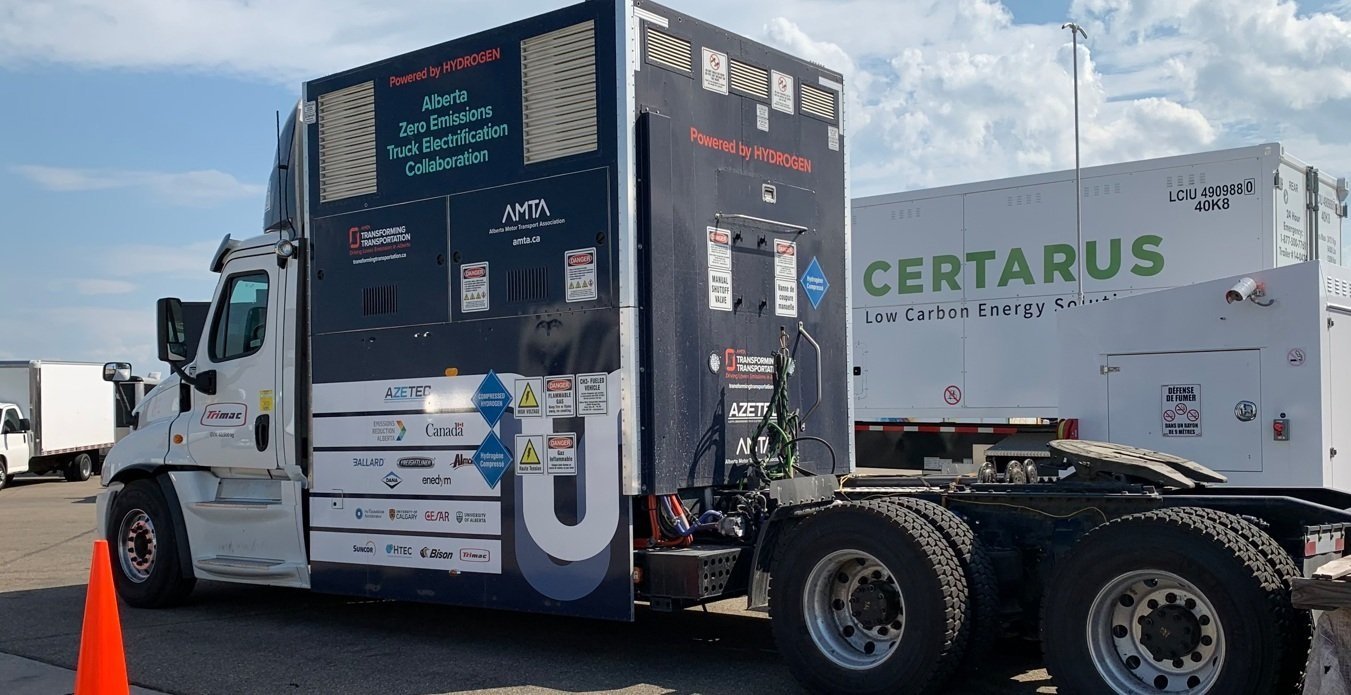Real world pilot testing in western Canada to support Canada’s zero-emissions targets
July 24, 2024
FOR IMMEDIATE RELEASE
The Alberta Motor Transport Association (AMTA) is proud to lead Transport Canada’s Zero Emission Truck Testbed (ZETT) project. The ZETT project is a real-world pilot of emerging zero emission trucking technologies, evaluating heavy-duty zero-emissions vehicles, hydrogen fueling, and charging technology in Canadian operations.
ZETT will include real-world testing consisting of four fleet operators and carriers – Sutco, Bison Transport, Trimac Transportation, and Arrow Transport – carrying different loads, with different driver profiles, routes, and geographic conditions during each of Canada’s four seasons. The trial is a unique opportunity to test both Class 8 heavy-duty battery electric (BEV) and hydrogen fuel cell electric vehicles (FCEV) on two distinct routes in Alberta and British Columbia.
“Insights gained from this project will contribute to the development of fleets’ heavy-duty transportation investment decisions, as industry gains better knowledge of the capabilities, costs and limitations of these new technologies” says Robert Harper, President, AMTA.
Medium and heavy-duty vehicles (MHDVs) account for approximately 27% of total transportation sector greenhouse gas emissions in the country. Canada’s Emissions Plan includes a commitment that 35% of new MHDVs sold by manufacturers must be zero-emissions vehicles by 2035, and that 100% of all new MHDVs sales are to be zero-emissions by 2040. Adoption of zero emission vehicles will be a key factor in achieving emission reduction goals.
“Reducing emissions from heavy-duty vehicles is vital for a cleaner transportation sector and a key piece of Canada’s Emissions Reduction Plan. The ZETT pilot project in Alberta and British Columbia will help map a path forward to cut greenhouse gas emissions and promote sustainable commercial transport solutions nationwide,” says The Honourable Pablo Rodriguez, Minister of Transport.
Technical training sessions will be provided to participants interacting with the vehicles, including drivers, mechanics, tow truck drivers, and first responders, to support regulatory and permitting bodies to advance the growing commercial ecosystem.
Deloitte Canada will oversee stakeholder relations and the development, implementation, and performance reporting of the ZETT project. Canadian data captured on the performance and cost-effectiveness of zero-emission trucks in commercial freight operations will provide the transportation sector insights to support large-scale market adoption and help reduce emissions across the economy.
“We are honoured to be working with an industry-leading consortium of original equipment manufacturers, fleet carriers, and infrastructure partners and excited to help accelerate the decarbonization of Canada’s on-road freight sector with AMTA and Transport Canada,” says Andrew Pau, Transport Sector Leader, Government & Public Services, Deloitte Canada.
AMTA brings extensive expertise to ZETT. Through previous real-world trials, AMTA has operated FCEVs and BEVs with over 32 of the Association’s Carrier Members. As a transportation industry advocate, AMTA is committed to advancing safety and leveraging data analytics to support Canada’s developing zero-emissions market.
About the Alberta Motor Transport Association (AMTA)
Founded in 1938, the Alberta Motor Transport Association (AMTA) is a not-for-profit advocacy and safety training association that serves as the Voice, the Standard, and the Resource for commercial transportation in the province. AMTA offers a wide range of services to our members, including regulatory updates, workplace supports, and an array of safety and training initiatives. With a strong focus, AMTA is at the forefront of the commercial transportation industry’s transformation. amta.ca.

